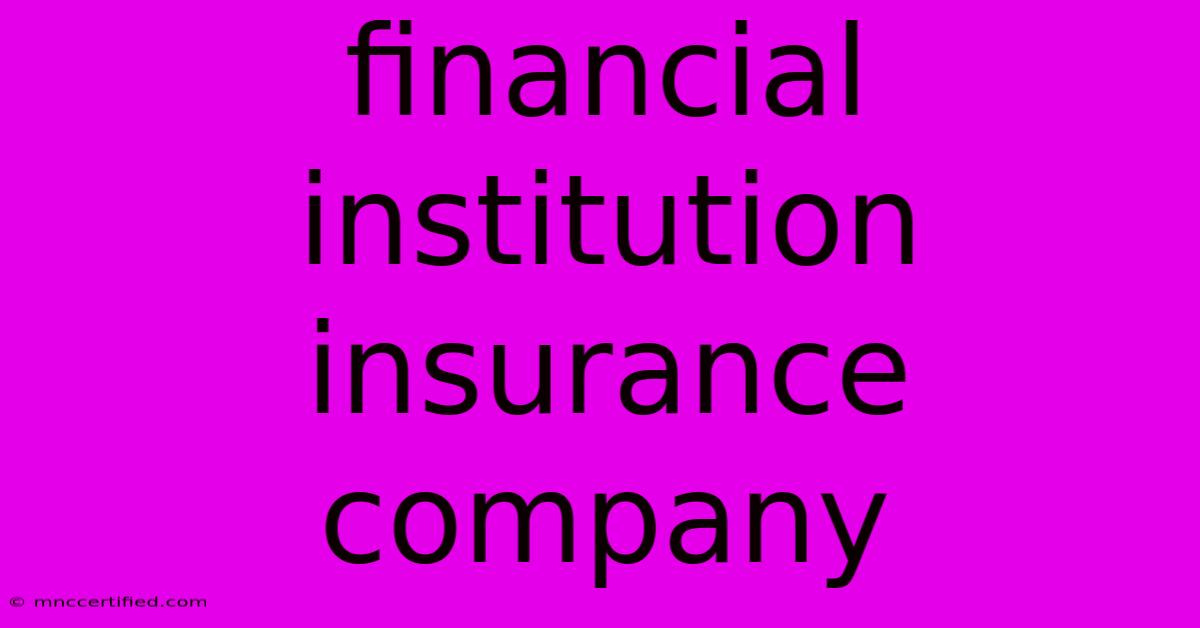Financial Institution Insurance Company

Table of Contents
Financial Institution Insurance: Protecting the Heart of the Economy
The financial services industry is the backbone of our modern economy. Banks, credit unions, investment firms, and other financial institutions play a crucial role in facilitating transactions, providing loans, and managing investments. However, this vital sector is also susceptible to a range of risks, from cyberattacks and data breaches to natural disasters and employee misconduct. That's where financial institution insurance comes in, providing a vital safety net for these organizations.
Understanding the Risks: Why Financial Institutions Need Specialized Insurance
Financial institutions face a unique set of risks that go beyond the typical concerns of other businesses. Here's a breakdown of some key threats:
- Cyberattacks and Data Breaches: With sensitive financial information at stake, financial institutions are prime targets for cybercriminals. Data breaches can lead to substantial financial losses, regulatory penalties, and reputational damage.
- Fraud and Embezzlement: Internal and external fraud, including employee theft and identity theft, pose significant risks.
- Natural Disasters: Earthquakes, floods, hurricanes, and other natural disasters can disrupt operations, damage property, and cause significant financial losses.
- Regulatory Compliance: The financial services industry is heavily regulated, and non-compliance can result in hefty fines and penalties.
- Professional Liability: Errors or omissions by financial professionals can lead to claims from clients and investors.
Types of Insurance for Financial Institutions: A Comprehensive Safety Net
To address these diverse risks, financial institutions require a tailored insurance portfolio. Here are some key types of coverage:
- Cybersecurity Insurance: Protects against financial losses, regulatory fines, and reputational damage resulting from cyberattacks and data breaches.
- Crime Insurance: Covers losses due to theft, fraud, embezzlement, and other criminal acts.
- Directors & Officers (D&O) Liability Insurance: Protects directors and officers from personal liability for claims arising from their decisions and actions.
- Errors & Omissions (E&O) Insurance: Covers professional liability arising from negligent acts or omissions by financial professionals.
- Property and Casualty Insurance: Protects against physical damage to property and business interruption caused by natural disasters, fires, and other perils.
- Fidelity Bond: Protects financial institutions against losses due to employee dishonesty.
Choosing the Right Financial Institution Insurance: Key Considerations
When selecting financial institution insurance, consider the following:
- Your Specific Risks: Identify the unique risks your organization faces and choose coverage accordingly.
- Policy Limits and Coverage: Ensure that the policy limits and coverage are sufficient to protect your assets.
- Reputation and Financial Stability of the Insurer: Choose a reputable insurer with a proven track record of financial stability.
- Claims Handling Process: Look for an insurer with a clear and efficient claims handling process.
The Benefits of Financial Institution Insurance: Peace of Mind and Business Continuity
Investing in comprehensive financial institution insurance offers several benefits:
- Financial Protection: Safeguard your assets and profits from potential losses.
- Regulatory Compliance: Ensure compliance with industry regulations and avoid potential fines and penalties.
- Business Continuity: Help ensure your operations can continue uninterrupted after a disaster or cyberattack.
- Reputational Protection: Safeguard your reputation from negative publicity and maintain the trust of clients and investors.
- Peace of Mind: Give yourself and your stakeholders peace of mind knowing that you are protected from unforeseen risks.
Financial institution insurance is an essential investment for any organization operating in this complex and dynamic sector. By understanding the risks, choosing appropriate coverage, and working with a reputable insurer, financial institutions can effectively mitigate risks, protect their assets, and maintain business continuity.

Thank you for visiting our website wich cover about Financial Institution Insurance Company. We hope the information provided has been useful to you. Feel free to contact us if you have any questions or need further assistance. See you next time and dont miss to bookmark.
Featured Posts
-
Gallbladder Surgery Cost With Insurance
Nov 08, 2024
-
Miami Local Health Insurance Agency Llc
Nov 08, 2024
-
Dog Insurance That Covers Hip Dysplasia
Nov 08, 2024
-
Designated Insured Vs Additional Insured
Nov 08, 2024
-
Ashley Jensens First Marriage Tragedy
Nov 08, 2024